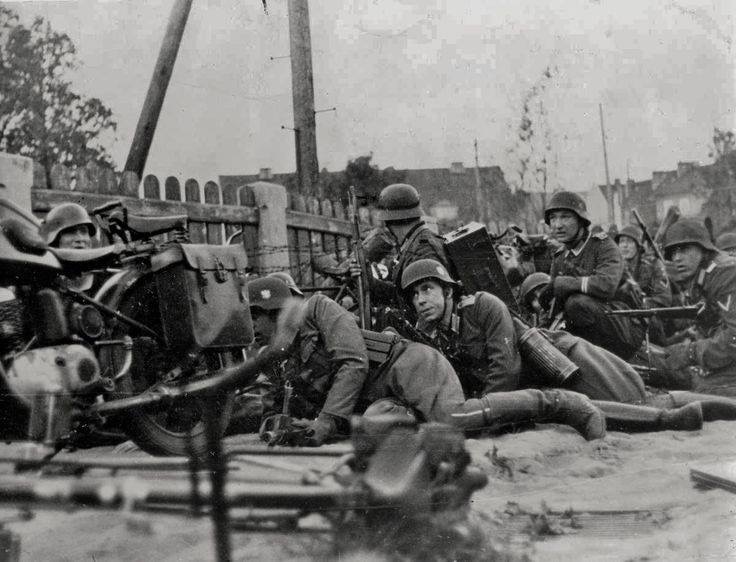Sunday 9 June 1940
 |
| General Erwin Rommel with his staff in a French field, Panzer 38(t)s in the distance, June 1940 (Ang, Federal Archive). |
At Rheims, the Panzer Group Kleist and Panzer Group Guderian team up and take Compiegne. The French are still holding the remnants of the Weygand Line between Amiens and Peronne, but the Weygand Line has become porous and the panzers are able to sidestep pockets of resistance.
The offensive broadens as German 2nd Army, 12th Army, and 16th Army of General von Rundstedt's Army Group A attacks toward Reims, supported by Panzer Group Guderian.
The Luftwaffe provides essential air coverage to the advancing panzer spearheads, which are without infantry support and vulnerable to air attack. Some units of the French Air Force (Armée de l'Air) begin withdrawing to North Africa. The French have flown 1,815 sorties since the beginning of Operation Fall Rot, with 518 of them bomber missions. This rate begins to fall off drastically beginning on 9 June.
RAF air support units are retreating before the Wehrmacht advance, some moving to Brittany and other places to the south.
The Norwegian campaign has been a complete German victory. Losses during the campaign:
Germans:
5296 dead/missing
160 fighters/bombers
80 transport planes (Ju 52s)
3 Cruisers
10 Destroyers
6 U-boats
4 cruisers and 6 destroyers damaged
Allies:
2119 British
1335 Norwegian
530 French
Most importantly, Germany has protected its source of iron ore, and also obtained advanced bases for the Kriegsmarine and useful air bases for the Luftwaffe.
General Dietl inspects Narvik and finds that the departing British have destroyed all rail and port facilities.
The 2nd Mountain Division continues marching up to Narvik from Sorfold, though its mission at Narvik to rescue General Dietl now appears to be moot.
Battle of the Atlantic: U-46 (Oberleutnant zur See Engelbert Endrass) torpedoes and sinks 2,155-ton Finnish freighter Margareta about 350 miles off of Cape Finisterre, Spain. There are 19 survivors and 5 crew perish. The survivors spend four days drifting in a lifeboat before being rescued.
British freighter Empire Commerce hits a mine and sinks in the North Sea.
Kriegsmarine patrol boat V-801 sinks from undetermined causes.
German raider Pinguin completes its trials. It will operate in the Indian Ocean.
Royal Navy ships detain Italian ship Rodi off Cape Matapan.
Convoy OB 164 departs from Liverpool, Convoy OG 33F forms off Gibraltar, Convoy HX 49 departs from Halifax.
Soviet/Japanese Relations: The two governments finalize a treaty ending the dispute in Manchukuo which led to the Battle of Khalkhin Gol. The Soviets claim territorial gains.
US Military: Destroyer USS Dickerson (DD-157) departs from Casablanca for Lisbon. It carries US nationals who wish to take the State Department's advice and return to the US aboard the passenger liner Washington. Washington itself departs from Bordeaux carrying 813 Americans leaving France. Washington is scheduled to depart Lisbon for Ireland and then the States tomorrow, 10 June 1940.
French Government: Prime Minister Paul Reynaud ponders evacuating his government from Paris with his cabinet. They ultimately decide to leave. General Weygand tells Reynaud that the Weygand Line on the Somme has collapsed and it is time to start negotiations.
The US heavy cruiser Vincennes (CA 44), accompanied by destroyers USS Truxton (DD-229) and Simpson (DD-221), arrive at Casablanca. Their mission is to transport the French gold reserves to New York.
General de Gaulle is in London for discussions with Prime Minister Churchill.
British Government: Hospital ship Atlantis, which had been spared by the Admiral Hipper, rendezvouses with battleship HMS Valiant and informs the Admiralty of the loss of the Orama. The Admiralty remains in the dark about the fate of HMS Glorious.
Italian Government: Mussolini prepares to invade French positions in the Alps. The slated start date is tomorrow, 10 June 1940.
The government orders all Italian ships to proceed at once to neutral ports.
China: At the continuing Battle of Tsaoyang-Ichang, the Japanese 11th Army makes gains around Tungshih, Tangyang, and Yuanan.
 |
| Wehrmacht troops during the Battle of France. |
June 1940
June 1, 1940: Devastation at Dunkirk
June 2, 1940: Hitler Visits France
June 3, 1940: Operation Paula
June 4, 1940: We Shall Fight
June 5, 1940: Fall Rot
June 6, 1940: Weygand Line Crumbling
June 7, 1940: British Evacuating Narvik
June 8, 1940: Operation Juno
June 9, 1940: Norway Capitulates
June 10, 1940: Mussolini Throws Down
June 11, 1940: Paris an Open City
June 12, 1940: Rommel at St. Valery
June 13, 1940: France Goes Alone
June 14, 1940: Paris Falls
June 15, 1940: Soviets Scoop Up Lithuania
June 16, 1940: Enter Pétain
June 17, 1940: The Lancastria Sinks
June 18, 1940: A Day of Leaders
June 19, 1940: U-boats Run Wild
June 20, 1940: Pétain Wilts
June 21, 1940: Hitler's Happiest Day
June 22, 1940: France Is Done
June 23, 1940: Hitler in Paris
June 24, 1940: Six Million Jews
June 25, 1940: German Celebrations
June 26, 1940: USSR Being Belligerent
June 27, 1940: Malta in Peril
June 28, 1940: Channel Islands Bombed
June 29, 1940: Gandhi Insists on Independence
June 30, 1940: Channel Islands Occupied
2020

No comments:
Post a Comment